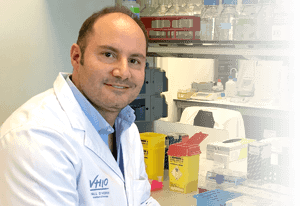
In line with its Strategic Plan 2017 – 2020, CIBERONC’s – Center for the Biomedical Research Network in Oncology – Scientific Committee has recently announced the five young research talents who have been appointed to lead one of the newly created modules covering Liquid Biopsy & Biomarkers, Cancer Bioinformatics & Omics, Drug Resistance & Novel Therapies, Immuno-Oncology, and Experimental Models – the first of which will be headed by Rodrigo A. Toledo, Translational Investigator of VHIO’s Gastrointestinal & Endocrine Tumors Group championed by Teresa Macarulla and directed by VHIO’s Director, Josep Tabernero.
Commenting for VHIO Communications Joaquín Arribas, Director of Preclinical Research at VHIO, ICREA Professor and CIBERONC’s Scientific Director observed, “Since our Institute incorporated in-house BEAMing liquid biopsy RAS biomarker technology in early 2015, the first academic test center to do so, our researchers have continued to pioneer the development of liquid biopsy and Droplet Digital PCR Bio-Rad technologies for the more effective, less invasive tracking of cancer, real time and in series. With such grounded expertise using this approach, I am delighted that Rodrigo has been matched as module leader for this particular focus area.”
Module themes were selected based their core implication and relevance across the majority of CIBERONC’s scientific research lines and projects, and each appointed head is setting up a working group incorporating between 7 – 15 researchers who will be collectively responsible for intelligence gathering, incorporating additional expert members, as well as sourcing and securing funding to help stimulate collaborative activities.
Upon receiving news about his appointment Rodrigo A. Toledo said, “The launch of these Modules will fortify CIBERONC to further harness oncological research of excellence at national level and collectively work towards translating discovery into benefits for an increasing number of patients with cancer. I am honored to take the lead on the group dedicated to liquid biopsy and biomarkers and, in collaboration with the network’s established research programs of excellence, I am dedicated to co-delivering on scientific objectives that center on accelerating more precise therapies and approaches against cancer.”
Also joining CIBERONC to flank its established research areas are the other four module leaders; Víctor Quesada – University of Oviedo, Alberto Ocaña – University of Castilla-La Mancha, Pedro Berraondo – CIMA – University of Navarra, and Patricia Pérez-Galán – August Pi i Sunyer Biomedical Research Institute – IDIBAPS, who are heading up Cancer Bioinformatics & Omics, Drug Resistance & Novel Therapies, Immuno-Oncology and Experimental Models, respectively.
Supported by the Instituto de Salud Carlos III (Institute of Health Carlos III – ISCIII), CIBERONC launched in 2016 as an extension of ISCIII’s highly successful and established Thematic Network for Cooperative Research in Cancer (RTICC), so superbly steered by Eugenio Santos, Director of the Cancer Research Center (CIC) in Salamanca, Spain.
Connecting fifty of the most renowned groups across Spain, CIBERONC has been organized into programs centered on and around two of the greatest challenges in solving cancer sooner namely, halting metastatic cell spread and reversing resistance to current therapies. Working in close connectivity to deliver on complex projects requiring the collaboration and expertise of multiple groups, these newly introduced modules represent important additions to CIBERONC’s team science of excellence.
###








